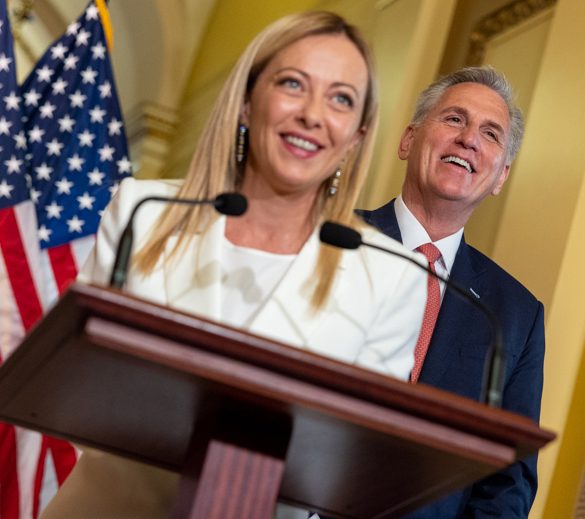An exit from Communist China’s Belt and Road pact appears to be on the agenda.
The unexpected contraction of Italian business activity last quarter is forcing Prime Minister Meloni to redouble her efforts to set a new, free-market path for the economy, including a renewed focus on exports — a course correction that comes as Italy reevaluates its trade ties with Communist China.

After touting Italy’s impressive economic growth on her watch, Prime Minister Meloni was gobsmacked by the news that output shrank by 0.3 percent in the second quarter — even as the overall Eurozone expanded. The International Monetary Fund’s projection that Italian GDP will increase 1.1 percent in 2023 offered but cold comfort.
Ms. Meloni is well aware that there’s more to the story.
The Italian economic resurgence of the 1950s was a sui generis miracle, vaulting the Magic Boot into the ranks of the advanced industrial nations. This phenomenon was predicated on exporting innovative Italian products around the globe. “Made in Italy” became a symbol of economic vibrancy.
Italy enjoys a comparative advantage in pharmaceuticals and machinery — including computers, ships, automotive products, and iron and steel goods. Yet it registered a $32.2 billion trade deficit in 2022, which reversed the $42.7 billion surplus of 2021. Lackluster net exports in 2023 contributed to the second quarter results. Therein lies a tale — as well as a lesson for future relations with Communist China.
Though China is one of Italy’s most important trading partners, Rome regrets joining Beijing’s Belt and Road Initiative — an agreement inked by the prior Conte administration. In an interview with Corriere della Sera on July 30, the defense minister, Guido Crosetto, called Italy’s “decision to join” Belt and Road “an improvised and atrocious act.”
Politico’s European edition noted that “Italy’s exports to China increased only slightly” under the Belt and Road pact, to 16.4 billion euros last year from 13 billion euros in 2019. Meanwhile, Chinese exports to Italy rose to 57.5 billion euros from 31.7 billion euros. Politico added that investments related to Italy and the Belt and Road initiative plunged to $810 million in 2020 from $2.51 billion the year before.
What Prime Minister Conte signed up for in 2019 may well have been nothing more than a Trojan Horse designed to further Beijing’s geopolitical agenda. A phalanx of Chinese diplomats and officials descended on the Magic Boot recently in an effort to convince Italy to remain in Cathay’s 21st-century Silk Road.
Though Signora Meloni will soon journey to Beijing for a fence-mending, it appears that her government will most likely withdraw from Belt and Road no later than December. Ms. Meloni, who was depicted by David Broder as a philo-fascist authoritarian-in-the-making in a recent New York Times column, must contend with a Communist China that is paradoxically capitalistic.
Ironically, China’s evolution was presaged by Michael Ledeen in a Wall Street Journal opinion essay more than two decades ago when he warned that “China is evolving, but not toward democracy. It bears many hallmarks of a maturing fascist state. Just imagine if Italy were run by Mussolini’s heirs.”
Italy is not being run by a Mussolini-in waiting. During Ms. Meloni’s visit to Washington — and her colloquies with President Biden and Speaker McCarthy — Ms. Meloni hailed the long-standing bonds between Italy and the United States. Mr. McCarthy lauded the artist Costantino Brumidi, whose murals — the “Apotheosis of Washington” and the “Frieze of American History” — redefined the Capitol. And the Speaker spoke fondly of his maternal grandfather Guido Palladino.
Signora Meloni, too, hailed Thomas Jefferson, who named Capitol Hill — invoking Rome’s Temple of Jupiter Optimus Maximus on the Eternal City’s Capitoline Hill. Ms. Meloni is establishing recognition that Italy’s leadership role — in Europe, the Balkans, the Mediterranean, and the Pacific — strengthens the West.
Yet now she must double-down on reviving Italy’s economy for the long haul. While monitoring quarter-by-quarter economic data can be exasperating, a leader must not fixate on such snapshots. Italy holds the presidency of the Group of Seven in 2024. There is ample time before next year’s G-7 meeting for a turnaround.
Ms. Meloni is likely to stay the course on the free market reformation of the Italian economy. It took President Reagan two years into his first term to arrive at “Morning in America.” Or as Caesar Augustus averred: Festina lente (“Make haste slowly”). -RAI




Happy to hear that Prime Minster Meloni will stay the course on free market reformation of the Italian economy. I hope Italy and the United States wakes up to China’s goals. The less trade with China the safer we all will be.